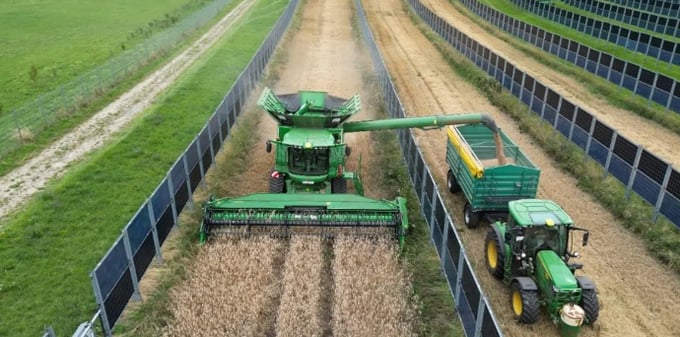June 2, 2025 | 19:57 GMT +7
June 2, 2025 | 19:57 GMT +7
Hotline: 0913.378.918
June 2, 2025 | 19:57 GMT +7
Hotline: 0913.378.918

US solar developer iSun is working with German agrivoltaics company Next2Sun to install the US’s first vertical agrivoltaics system.
US solar developer iSun is working with German agrivoltaics company Next2Sun to install the US’s first vertical agrivoltaics system.
Next2Sun installs bifacial solar panels on its patented vertical mounting system. It says its system is ideal for agriculture-based installations because it generates power during off-peak hours and avoids overbuilding on agricultural land. The system is already being used on farms in Germany (pictured above).
Construction will begin on the US’s first vertical agrivoltaics system at the beginning of 2024, in Vermont. The system will sit on 3.7 acres and feature 69 vertical rack elements, 30 feet apart, and each will hold two bifacial solar modules. Root vegetables such as carrots and beetroot, as well as saffron, will be planted between the solar rows.
iSun CEO Jeffrey Peck said, “Thanks to the vertical mounting of the modules and the adaptability of the installation to the needs of the farmer, the valuable land is almost completely preserved for agriculture.”
The companies don’t share what power the system will generate, who will benefit from the clean electricity, nor who the client is, but it’s pretty obvious that it’s a small to medium-sized farm because it’s in Vermont.
electrek

(VAN) Vikas Rambal has quietly built a $5 billion business empire in manufacturing, property and solar, and catapulted onto the Rich List.

(VAN) Available cropland now at less than five percent, according to latest geospatial assessment from FAO and UNOSAT.

(VAN) Alt Carbon has raised $12 million in a seed round as it plans to scale its carbon dioxide removal work in the South Asian nation.

(VAN) Attempts to bring down the price of the Japanese staple have had little effect amid a cost-of-living crisis.

(VAN) Fourth most important food crop in peril as Latin America and Caribbean suffer from slow-onset climate disaster.

(VAN) Shifting market dynamics and the noise around new legislation has propelled Trouw Nutrition’s research around early life nutrition in poultry. Today, it continues to be a key area of research.

(VAN) India is concerned about its food security and the livelihoods of its farmers if more US food imports are allowed.